Deck 5: Systems of Equations and Inequalities
Question
Question
Question
Question
Question
Question
Question
Question
Question
Question
Question
Question
Question
Question
Question
Question
Question
Question
Question
Question
Question
Question
Question
Question
Question
Question
Question
Question
Question
Question
Question
Question
Question
Question
Question
Question
Question
Question
Question
Question
Question
Question
Question
Question
Question
Question
Question
Question
Question
Question
Question
Question
Question
Question
Question
Question
Question
Question
Question
Question
Question
Question
Question
Question
Question
Question
Question
Question
Question
Question
Question
Question
Question
Question
Question
Question
Question
Question
Question
Question

Unlock Deck
Sign up to unlock the cards in this deck!
Unlock Deck
Unlock Deck
1/94
Play
Full screen (f)
Deck 5: Systems of Equations and Inequalities
1
Solve the system by the method of substitution. 
A) (-3, 48), (4, -29), (1, -8)
B) (-3, 48), (-1, 16)
C) (-4, 67), (1, -8)
D) (-3, 48), (-4, 67), (0, 3)
E) no real solution

A) (-3, 48), (4, -29), (1, -8)
B) (-3, 48), (-1, 16)
C) (-4, 67), (1, -8)
D) (-3, 48), (-4, 67), (0, 3)
E) no real solution
D
2
Solve the system of equations below by the substitution method. 

A)
B)
C)
D)
E) no solution


A)

B)

C)

D)

E) no solution
E
3
A total of $50,000 is invested in two funds paying 6.5% and 7.5% simple interest.The total yearly interest is $3600.How much is invested at the 6.5% rate?
A) $28,000
B) $12,000
C) $26,000
D) $15,000
E) $20,000
A) $28,000
B) $12,000
C) $26,000
D) $15,000
E) $20,000
D
4
Solve the system graphically. 
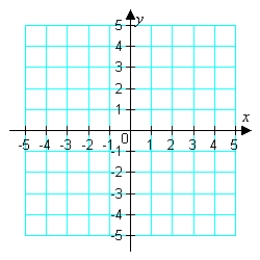
A)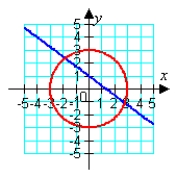

B)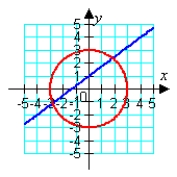

C)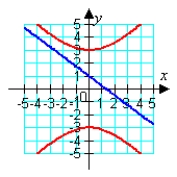

D)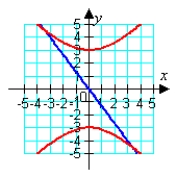

E)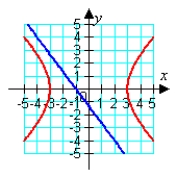



A)


B)


C)


D)


E)



Unlock Deck
Unlock for access to all 94 flashcards in this deck.
Unlock Deck
k this deck
5
Solve the system by the method of elimination. 
A)
B)
C)
D)
E) inconsistent

A)

B)

C)

D)

E) inconsistent

Unlock Deck
Unlock for access to all 94 flashcards in this deck.
Unlock Deck
k this deck
6
Solve the system of equations below. 
A) and
and 
B) and
and 
C) and
and 
D) and
and 
E) and
and 

A)
 and
and 
B)
 and
and 
C)
 and
and 
D)
 and
and 
E)
 and
and 

Unlock Deck
Unlock for access to all 94 flashcards in this deck.
Unlock Deck
k this deck
7
Solve the system by the method of substitution. 
A) (2, 1), (-1, -2)
B) (2, 3), (-1, 0)
C) (2, -1), (-1, -4)
D) (2, -1)
E) no real solution

A) (2, 1), (-1, -2)
B) (2, 3), (-1, 0)
C) (2, -1), (-1, -4)
D) (2, -1)
E) no real solution

Unlock Deck
Unlock for access to all 94 flashcards in this deck.
Unlock Deck
k this deck
8
Use a graphing utility to find the point(s) of intersection of the graphs. 
A)
B)
C)
D)
E)

A)

B)

C)

D)

E)


Unlock Deck
Unlock for access to all 94 flashcards in this deck.
Unlock Deck
k this deck
9
Solve the system by the method of substitution. 
A) (-2, 1)
B) (-1, -2)
C) (1, -2)
D) (-2, -1)
E) (2, 1)

A) (-2, 1)
B) (-1, -2)
C) (1, -2)
D) (-2, -1)
E) (2, 1)

Unlock Deck
Unlock for access to all 94 flashcards in this deck.
Unlock Deck
k this deck
10
Determine which ordered pair is a solution of the system. 
A) (2, -5)
B) (5, 2)
C) (-3, 2)
D) (-5, 2)
E) (-2, -3)

A) (2, -5)
B) (5, 2)
C) (-3, 2)
D) (-5, 2)
E) (-2, -3)

Unlock Deck
Unlock for access to all 94 flashcards in this deck.
Unlock Deck
k this deck
11
Find the sales necessary to break even (R - C = 0) for the cost C of producing x units and the revenue R obtained by selling x units.(Round to the nearest whole unit.) 
A) 666 units
B) 666 units or 714 units
C) 714 units
D) 698 units
E) no real solution

A) 666 units
B) 666 units or 714 units
C) 714 units
D) 698 units
E) no real solution

Unlock Deck
Unlock for access to all 94 flashcards in this deck.
Unlock Deck
k this deck
12
Solve the system below by method of substitution, if possible. 
A) no solution
B)
C)
D) ,
, 
E)

A) no solution
B)

C)

D)
 ,
, 
E)


Unlock Deck
Unlock for access to all 94 flashcards in this deck.
Unlock Deck
k this deck
13
You are offered two different jobs.Company A offers an annual salary of $34,000 plus a year-end bonus of 3.5% of your total sales.Company B offers a salary of $28,000 plus a year-end bonus of 7.5% of your total sales.What is the amount you must sell in one year to earn the same salary working for either company?
A) $170,000
B) $120,000
C) $150,000
D) $90,000
E) $130,000
A) $170,000
B) $120,000
C) $150,000
D) $90,000
E) $130,000

Unlock Deck
Unlock for access to all 94 flashcards in this deck.
Unlock Deck
k this deck
14
The sales of various types of lawn and garden items vary according to the season.At a certain home improvement store, the monthly sales H of garden hoses (hoses sold per month) declines from July to October whereas the monthly sales of lawn rakes R (rakes sold per month) increase during this same interval.The sales of these two items during the calendar months July-October are modeled by the equations: H(t) = 64 - 6t
R(t) = 17t - 97,
Where t is the month (t = 7 corresponds to July).In which month does the number of rakes sold equal the number of hoses sold?
A) August
B) September
C) October
D) November
E) July
R(t) = 17t - 97,
Where t is the month (t = 7 corresponds to July).In which month does the number of rakes sold equal the number of hoses sold?
A) August
B) September
C) October
D) November
E) July

Unlock Deck
Unlock for access to all 94 flashcards in this deck.
Unlock Deck
k this deck
15
Determine which ordered pair is a solution of the system. 
A)
B)
C) (-9, 86)
D)
E) (-9, 17)

A)

B)

C) (-9, 86)
D)

E) (-9, 17)

Unlock Deck
Unlock for access to all 94 flashcards in this deck.
Unlock Deck
k this deck
16
Determine whether the system of equations below has one solution, two solutions, or no solution. 
A) two solutions
B) no solution
C) one solution

A) two solutions
B) no solution
C) one solution

Unlock Deck
Unlock for access to all 94 flashcards in this deck.
Unlock Deck
k this deck
17
Solve each system of equations by the substitution method. 

A)
B)
C)
D)
E) no solution


A)

B)

C)

D)

E) no solution

Unlock Deck
Unlock for access to all 94 flashcards in this deck.
Unlock Deck
k this deck
18
Solve the system by the method of substitution. 
A) (12, 5), (-12, -5)
B) (12, 5)
C) (12, 5), (-12, 5), (-12, -5), (12, -5)
D) (5, 12), (5, -12)
E) no real solution

A) (12, 5), (-12, -5)
B) (12, 5)
C) (12, 5), (-12, 5), (-12, -5), (12, -5)
D) (5, 12), (5, -12)
E) no real solution

Unlock Deck
Unlock for access to all 94 flashcards in this deck.
Unlock Deck
k this deck
19
Determine which ordered pair is a solution of the system. 
A) (-4, -2)
B) (-8, 9)
C) (-8, -1)
D) (-2, 4)
E) (-4, 2)

A) (-4, -2)
B) (-8, 9)
C) (-8, -1)
D) (-2, 4)
E) (-4, 2)

Unlock Deck
Unlock for access to all 94 flashcards in this deck.
Unlock Deck
k this deck
20
You invest $3700 in a fishing lure business.A lure costs $1.60 to produce and will be sold for $6.20.How many lures must you sell to break even?
A) 1716 lures
B) 805 lures
C) 2313 lures
D) 475 lures
E) 597 lures
A) 1716 lures
B) 805 lures
C) 2313 lures
D) 475 lures
E) 597 lures

Unlock Deck
Unlock for access to all 94 flashcards in this deck.
Unlock Deck
k this deck
21
Determine which of the following systems of equations is in row-echelon form. System I:  System II:
System II:  System III:
System III: 
A) None of the systems are in row-echelon form.
B) Only system II is in row-echelon form.
C) Only systems II and III are in row-echelon form.
D) All systems are in row-echelon form.
E) Only systems I and III are in row-echelon form.
 System II:
System II:  System III:
System III: 
A) None of the systems are in row-echelon form.
B) Only system II is in row-echelon form.
C) Only systems II and III are in row-echelon form.
D) All systems are in row-echelon form.
E) Only systems I and III are in row-echelon form.

Unlock Deck
Unlock for access to all 94 flashcards in this deck.
Unlock Deck
k this deck
22
Solve the system by the method of elimination. 
A)
B)
C)
D)
E) inconsistent

A)

B)

C)

D)

E) inconsistent

Unlock Deck
Unlock for access to all 94 flashcards in this deck.
Unlock Deck
k this deck
23
Solve the system of linear equations. 
A)
B)
C)
D)
E)

A)

B)

C)

D)

E)


Unlock Deck
Unlock for access to all 94 flashcards in this deck.
Unlock Deck
k this deck
24
Determine which one of the ordered triples below is a solution of the given system of equations. 
A) (7, 5, 17)
B) (-3, -2, 6)
C) (-2, -6, 3)
D) (7, 5, 6)
E) (6, -2, -3)

A) (7, 5, 17)
B) (-3, -2, 6)
C) (-2, -6, 3)
D) (7, 5, 6)
E) (6, -2, -3)

Unlock Deck
Unlock for access to all 94 flashcards in this deck.
Unlock Deck
k this deck
25
A total of $28,000 is invested in two corporate bonds that pay 11% and 4% simple interest.The total annual interest is $2170.How much is invested in the 4% bond?
A) $17,000
B) $15,000
C) $13,000
D) $18,000
E) $16,000
A) $17,000
B) $15,000
C) $13,000
D) $18,000
E) $16,000

Unlock Deck
Unlock for access to all 94 flashcards in this deck.
Unlock Deck
k this deck
26
The supply and demand equations for a small LCD television are given by  where
where  is the price (in dollars) and
is the price (in dollars) and  represents the number of televisions.For how many units will the quantity demanded equal the quantity supplied? What price corresponds to this value?
represents the number of televisions.For how many units will the quantity demanded equal the quantity supplied? What price corresponds to this value?
A) 1855 units at $463.75
B) 2230 units at $257.50
C) 1480 units at $257.50
D) 2230 units at $670.00
E) 1480 units at $670.00
 where
where  is the price (in dollars) and
is the price (in dollars) and  represents the number of televisions.For how many units will the quantity demanded equal the quantity supplied? What price corresponds to this value?
represents the number of televisions.For how many units will the quantity demanded equal the quantity supplied? What price corresponds to this value?A) 1855 units at $463.75
B) 2230 units at $257.50
C) 1480 units at $257.50
D) 2230 units at $670.00
E) 1480 units at $670.00

Unlock Deck
Unlock for access to all 94 flashcards in this deck.
Unlock Deck
k this deck
27
Use back-substitution to solve the system of linear equations. 
A)
B)
C)
D)
E)

A)

B)

C)

D)

E)


Unlock Deck
Unlock for access to all 94 flashcards in this deck.
Unlock Deck
k this deck
28
One acetic acid solution is 60% water and another is 40% water.How many liters of each solution should be mixed to produce 20 liters of a solution that is 49% water?
A) 5 liters of the 60% solution and 15 liters of the 40% solution
B) 9 liters of the 60% solution and 11 liters of the 40% solution
C) 15 liters of the 60% solution and 5 liters of the 40% solution
D) 6 liters of the 60% solution and 14 liters of the 40% solution
E) 14 liters of the 60% solution and 6 liters of the 40% solution
A) 5 liters of the 60% solution and 15 liters of the 40% solution
B) 9 liters of the 60% solution and 11 liters of the 40% solution
C) 15 liters of the 60% solution and 5 liters of the 40% solution
D) 6 liters of the 60% solution and 14 liters of the 40% solution
E) 14 liters of the 60% solution and 6 liters of the 40% solution

Unlock Deck
Unlock for access to all 94 flashcards in this deck.
Unlock Deck
k this deck
29
Solve the system of linear equations. 
A)
B)
C)
D)
E)

A)

B)

C)

D)

E)


Unlock Deck
Unlock for access to all 94 flashcards in this deck.
Unlock Deck
k this deck
30
Solve the system of linear equations. 
A)
B)
C)
D)
E) inconsistent

A)

B)

C)

D)

E) inconsistent

Unlock Deck
Unlock for access to all 94 flashcards in this deck.
Unlock Deck
k this deck
31
Find the least squares regression line y = ax + b for the points  by solving the system for a and b.
by solving the system for a and b. 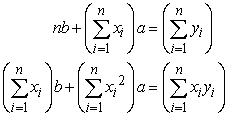 Points:
Points:  space
space
A) y = 1.92x - 2.92
B) y = -0.15x + 1.92
C) y = -2.53x + 1.63
D) y = -2.92x + 1.92
E) y = 1.19x + 1.63
 by solving the system for a and b.
by solving the system for a and b.  Points:
Points:  space
spaceA) y = 1.92x - 2.92
B) y = -0.15x + 1.92
C) y = -2.53x + 1.63
D) y = -2.92x + 1.92
E) y = 1.19x + 1.63

Unlock Deck
Unlock for access to all 94 flashcards in this deck.
Unlock Deck
k this deck
32
The concentration  (in parts per million) of carbon dioxide in the atmosphere is measured at the Mauna Loa Observatory in Hawaii.The greatest monthly carbon dioxide concentration for each year from 2002 to 2006 is shown in the table.
(in parts per million) of carbon dioxide in the atmosphere is measured at the Mauna Loa Observatory in Hawaii.The greatest monthly carbon dioxide concentration for each year from 2002 to 2006 is shown in the table. 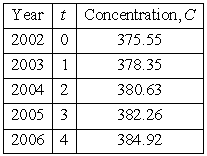 Solve the following system for
Solve the following system for  and
and  to find the least squares regression line
to find the least squares regression line  for the data.Let
for the data.Let  represent the year, with
represent the year, with  corresponding to 2002.
corresponding to 2002.  Use the least square regression line to predict the largest monthly carbon dioxide concentration in 2014.Round your answer to the nearest hundredths part per million.
Use the least square regression line to predict the largest monthly carbon dioxide concentration in 2014.Round your answer to the nearest hundredths part per million.
A) 396.20 parts per million
B) 400.73 parts per million
C) 389.40 parts per million
D) 398.46 parts per million
E) 402.99 parts per million
 (in parts per million) of carbon dioxide in the atmosphere is measured at the Mauna Loa Observatory in Hawaii.The greatest monthly carbon dioxide concentration for each year from 2002 to 2006 is shown in the table.
(in parts per million) of carbon dioxide in the atmosphere is measured at the Mauna Loa Observatory in Hawaii.The greatest monthly carbon dioxide concentration for each year from 2002 to 2006 is shown in the table.  Solve the following system for
Solve the following system for  and
and  to find the least squares regression line
to find the least squares regression line  for the data.Let
for the data.Let  represent the year, with
represent the year, with  corresponding to 2002.
corresponding to 2002.  Use the least square regression line to predict the largest monthly carbon dioxide concentration in 2014.Round your answer to the nearest hundredths part per million.
Use the least square regression line to predict the largest monthly carbon dioxide concentration in 2014.Round your answer to the nearest hundredths part per million.A) 396.20 parts per million
B) 400.73 parts per million
C) 389.40 parts per million
D) 398.46 parts per million
E) 402.99 parts per million

Unlock Deck
Unlock for access to all 94 flashcards in this deck.
Unlock Deck
k this deck
33
Solve the system below by elimination if possible.Then state whether the system below is consistent or inconsistent. 
A) The system is consistent and its solution is
B) The system is consistent and its solution is
C) The system is consistent and its solution is
D) The system is consistent and its solution is
E) The system is inconsistent and no solution exists.

A) The system is consistent and its solution is

B) The system is consistent and its solution is

C) The system is consistent and its solution is

D) The system is consistent and its solution is

E) The system is inconsistent and no solution exists.

Unlock Deck
Unlock for access to all 94 flashcards in this deck.
Unlock Deck
k this deck
34
An airplane flying into a headwind travels 280 miles in 2 hours and 48 minutes.On the return flight, the distance is traveled in 2 hours.Find the airspeed of the plane and the speed of the wind, assuming that both remain constant.
A) plane speed = 135 mph; wind speed = 27 mph
B) plane speed = 135 mph; wind speed = 20 mph
C) plane speed = 97 mph; wind speed = 9 mph
D) plane speed = 97 mph; wind speed = 20 mph
E) plane speed = 120 mph; wind speed = 20 mph
A) plane speed = 135 mph; wind speed = 27 mph
B) plane speed = 135 mph; wind speed = 20 mph
C) plane speed = 97 mph; wind speed = 9 mph
D) plane speed = 97 mph; wind speed = 20 mph
E) plane speed = 120 mph; wind speed = 20 mph

Unlock Deck
Unlock for access to all 94 flashcards in this deck.
Unlock Deck
k this deck
35
Solve each system of equations by the elimination method. 

A)
B)
C)
D)
E) no solution


A)

B)

C)

D)

E) no solution

Unlock Deck
Unlock for access to all 94 flashcards in this deck.
Unlock Deck
k this deck
36
Solve the system by elimination. 
A)
B)
C)
D)
E) inconsistent

A)

B)

C)

D)

E) inconsistent

Unlock Deck
Unlock for access to all 94 flashcards in this deck.
Unlock Deck
k this deck
37
Solve the system of equations below, if possible. 
A)
B)
C)
D)
E) The system is inconsistent.

A)

B)

C)

D)

E) The system is inconsistent.

Unlock Deck
Unlock for access to all 94 flashcards in this deck.
Unlock Deck
k this deck
38
Use the statements below to write a system of equations.Solve the system by elimination. The sum of twice a number  and a number
and a number  is -14.The difference of
is -14.The difference of  and
and  is 2.
is 2.
A)
B)
C)
D)
E)
 and a number
and a number  is -14.The difference of
is -14.The difference of  and
and  is 2.
is 2.A)

B)

C)

D)

E)


Unlock Deck
Unlock for access to all 94 flashcards in this deck.
Unlock Deck
k this deck
39
Find the equilibrium point of the demand and supply equations.(The equilibrium point is the price p and number of units x that satisfy both the demand and supply equations.) Demand Supply
P = 36 - 0.02x p = 0.5x - 380
A)
B)
C)
D)
E) inconsistent
P = 36 - 0.02x p = 0.5x - 380
A)

B)

C)

D)

E) inconsistent

Unlock Deck
Unlock for access to all 94 flashcards in this deck.
Unlock Deck
k this deck
40
Solve the system by the method of elimination. 
A)
B)
C)
D)
E) inconsistent

A)

B)

C)

D)

E) inconsistent

Unlock Deck
Unlock for access to all 94 flashcards in this deck.
Unlock Deck
k this deck
41
A chemist needs 20 liters of a 45% acid solution.The solution is to be mixed from three solutions whose acid concentrations are 10%, 20%, and 50%.How many liters of the 50% solution should the chemist use if trying to use as little as possible of the 50% solution?
A) liters
liters
B) liters
liters
C) liters
liters
D) liters
liters
E) liters
liters
A)
 liters
litersB)
 liters
litersC)
 liters
litersD)
 liters
litersE)
 liters
liters
Unlock Deck
Unlock for access to all 94 flashcards in this deck.
Unlock Deck
k this deck
42
Sketch the graph of the inequality below. 
A)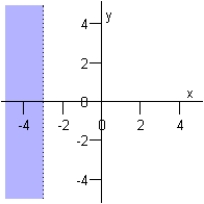
B)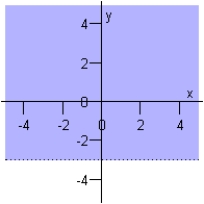
C)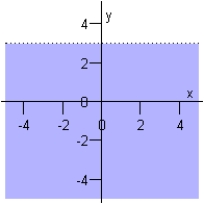
D)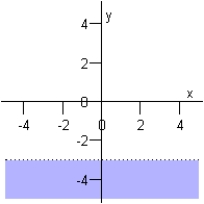
E)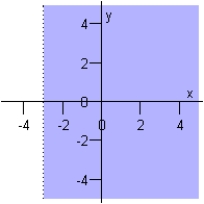

A)

B)

C)

D)

E)


Unlock Deck
Unlock for access to all 94 flashcards in this deck.
Unlock Deck
k this deck
43
Which of the following systems of equations has as a solution the ordered triple  System I:
System I:  System II:
System II:  System III:
System III: 
A) Only system II has the ordered triple as a solution.
as a solution.
B) Only systems I and II have the ordered triple as a solution.
as a solution.
C) Each of the systems I, II, and III has the ordered triple as a solution.
as a solution.
D) Only system III has the ordered triple as a solution.
as a solution.
E) None of the systems has the ordered triple as a solution.
as a solution.
 System I:
System I:  System II:
System II:  System III:
System III: 
A) Only system II has the ordered triple
 as a solution.
as a solution.B) Only systems I and II have the ordered triple
 as a solution.
as a solution.C) Each of the systems I, II, and III has the ordered triple
 as a solution.
as a solution.D) Only system III has the ordered triple
 as a solution.
as a solution.E) None of the systems has the ordered triple
 as a solution.
as a solution.
Unlock Deck
Unlock for access to all 94 flashcards in this deck.
Unlock Deck
k this deck
44
Solve the system of equations below: 


A)
B)
C)
D)
E)



A)

B)

C)

D)

E)


Unlock Deck
Unlock for access to all 94 flashcards in this deck.
Unlock Deck
k this deck
45
Solve the system of linear equations. 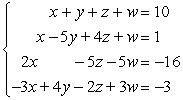
A)
B)
C)
D)
E) inconsistent

A)

B)

C)

D)

E) inconsistent

Unlock Deck
Unlock for access to all 94 flashcards in this deck.
Unlock Deck
k this deck
46
Which of the following three ordered triples are of the given form below.  Triple I :
Triple I :  Triple II :
Triple II :  Triple III :
Triple III : 
A) Only triple I and II are in the given form.
B) None of the triples are in the given form.
C) Only triple I and III are in the given form.
D) Only triple III is in the given form.
E) Only triple II is in the given form.
 Triple I :
Triple I :  Triple II :
Triple II :  Triple III :
Triple III : 
A) Only triple I and II are in the given form.
B) None of the triples are in the given form.
C) Only triple I and III are in the given form.
D) Only triple III is in the given form.
E) Only triple II is in the given form.

Unlock Deck
Unlock for access to all 94 flashcards in this deck.
Unlock Deck
k this deck
47
Solve the system of equations below: 

A)
B)
C)
D)
E)


A)

B)

C)

D)

E)


Unlock Deck
Unlock for access to all 94 flashcards in this deck.
Unlock Deck
k this deck
48
A real estate company borrows $2,000,000.Some of the money is borrowed at 4%, some at 8%, and some at 11% simple annual interest.How much is borrowed at the 11% rate when the total annual interest is $130,000 and the amount borrowed at 4% is the same as the amount borrowed at 8%?
A) $500,000
B) $200,000
C) $300,000
D) $600,000
E) $900,000
A) $500,000
B) $200,000
C) $300,000
D) $600,000
E) $900,000

Unlock Deck
Unlock for access to all 94 flashcards in this deck.
Unlock Deck
k this deck
49
A mixture of 5 gallons of chemical A, 6 gallons of chemical B, and 22 gallons of chemical C is required to kill a crop destroying insect.Commercial spray X contains 1, 2, and 3 parts of these chemicals, respectively.Commercial spray Y contains only chemical C.Commercial spray Z contains chemicals A, B, and C in equal amounts.How much of commercial spray  is needed to obtain the desired mixture?
is needed to obtain the desired mixture?
A) 2 gallons
B) 3 gallons
C) 1 gallon
D) 6 gallons
E) 15 gallons
 is needed to obtain the desired mixture?
is needed to obtain the desired mixture?A) 2 gallons
B) 3 gallons
C) 1 gallon
D) 6 gallons
E) 15 gallons

Unlock Deck
Unlock for access to all 94 flashcards in this deck.
Unlock Deck
k this deck
50
Use a graphing utility to graph the inequality.Shade the region representing the solution. 
A)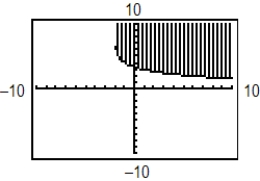
B)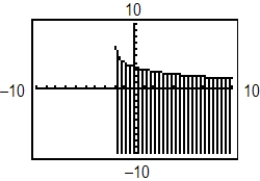
C)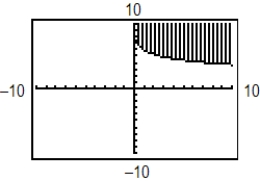
D)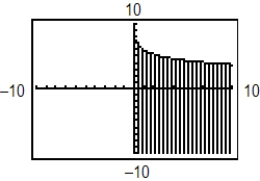
E)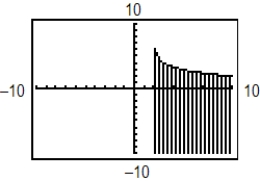

A)

B)

C)

D)

E)


Unlock Deck
Unlock for access to all 94 flashcards in this deck.
Unlock Deck
k this deck
51
Graph the solution set of the system of inequalities below. 
A)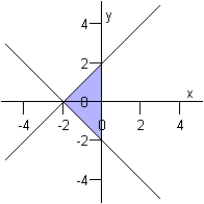
B)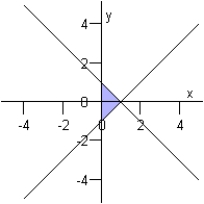
C)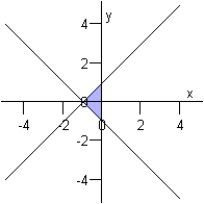
D)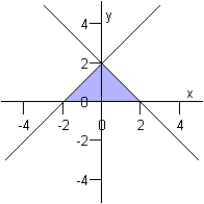
E)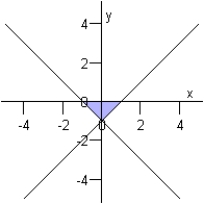

A)

B)

C)

D)

E)


Unlock Deck
Unlock for access to all 94 flashcards in this deck.
Unlock Deck
k this deck
52
The federal debt of the United States as a percentage of the Gross Domestic Product (GDP) from 2001 to 2005 is shown in the table.In the table,  represents the year, with
represents the year, with  corresponding to 2002.
corresponding to 2002. 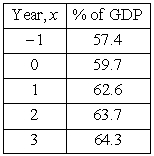 Find the least squares regression parabola
Find the least squares regression parabola  for the data by solving the following system.
for the data by solving the following system.  Use the model to predict the federal debt as percents of GDP in 2010.Round to the nearest tenth percents.
Use the model to predict the federal debt as percents of GDP in 2010.Round to the nearest tenth percents.
A) 64.2%
B) 52.7%
C) 56.5%
D) 61.9%
E) 48.2%
 represents the year, with
represents the year, with  corresponding to 2002.
corresponding to 2002.  Find the least squares regression parabola
Find the least squares regression parabola  for the data by solving the following system.
for the data by solving the following system.  Use the model to predict the federal debt as percents of GDP in 2010.Round to the nearest tenth percents.
Use the model to predict the federal debt as percents of GDP in 2010.Round to the nearest tenth percents.A) 64.2%
B) 52.7%
C) 56.5%
D) 61.9%
E) 48.2%

Unlock Deck
Unlock for access to all 94 flashcards in this deck.
Unlock Deck
k this deck
53
Find an equation of the form  whose graph passes through the points
whose graph passes through the points 
 and
and 
A)
B)
C)
D)
E)
 whose graph passes through the points
whose graph passes through the points 
 and
and 
A)

B)

C)

D)

E)


Unlock Deck
Unlock for access to all 94 flashcards in this deck.
Unlock Deck
k this deck
54
Write an inequality for the shaded region shown in the figure. 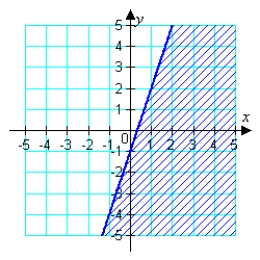
A)
B)
C)
D)
E)

A)

B)

C)

D)

E)


Unlock Deck
Unlock for access to all 94 flashcards in this deck.
Unlock Deck
k this deck
55
A residential building contractor borrowed $31,000 to complete a new home.Some of the money was borrowed at 5%, some at 7%, and some at 9%.How much was borrowed at each rate if the annual interest owed was $2050 and the amount borrowed at 7% is three times more than the amount borrowed at 9%?
A) $9000 at 5%; $17,000 at 7%; $5000 at 9%
B) $11,000 at 5%; $15,000 at 7%; $5000 at 9%
C) $9000 at 5%; $16,000 at 7%; $6000 at 9%
D) $10,000 at 5%; $13,000 at 7%; $7000 at 9%
E) $9000 at 5%; $18,000 at 7%; $6000 at 9%
A) $9000 at 5%; $17,000 at 7%; $5000 at 9%
B) $11,000 at 5%; $15,000 at 7%; $5000 at 9%
C) $9000 at 5%; $16,000 at 7%; $6000 at 9%
D) $10,000 at 5%; $13,000 at 7%; $7000 at 9%
E) $9000 at 5%; $18,000 at 7%; $6000 at 9%

Unlock Deck
Unlock for access to all 94 flashcards in this deck.
Unlock Deck
k this deck
56
Sketch the graph of the inequality below. 
A)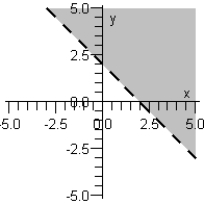
B)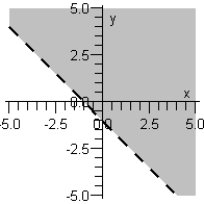
C)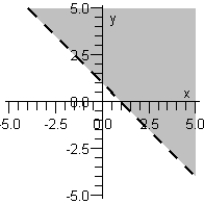
D)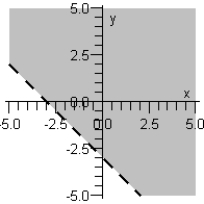
E)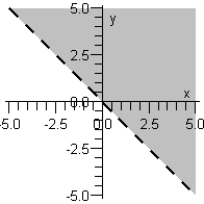

A)

B)

C)

D)

E)


Unlock Deck
Unlock for access to all 94 flashcards in this deck.
Unlock Deck
k this deck
57
Find the equation of the circle  that passes through the points
that passes through the points 
A)
B)
C)
D)
E)
 that passes through the points
that passes through the points 
A)

B)

C)

D)

E)


Unlock Deck
Unlock for access to all 94 flashcards in this deck.
Unlock Deck
k this deck
58
Sketch the graph of the inequality below. 
A)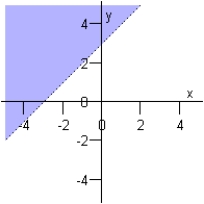
B)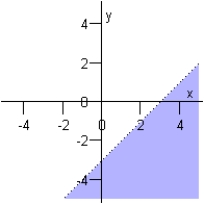
C)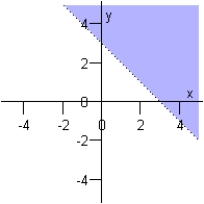
D)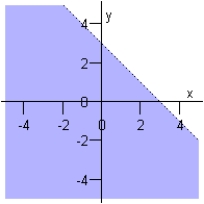
E)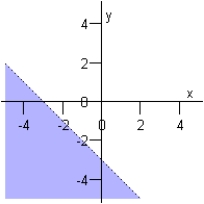

A)

B)

C)

D)

E)


Unlock Deck
Unlock for access to all 94 flashcards in this deck.
Unlock Deck
k this deck
59
Solve the system of equations below: 


A)
B)
C)
D)
E)



A)

B)

C)

D)

E)


Unlock Deck
Unlock for access to all 94 flashcards in this deck.
Unlock Deck
k this deck
60
Find the equation of the parabola  that passes through the points.
that passes through the points. 
A)
B)
C)
D)
E)
 that passes through the points.
that passes through the points. 
A)

B)

C)

D)

E)


Unlock Deck
Unlock for access to all 94 flashcards in this deck.
Unlock Deck
k this deck
61
A company has budgeted a maximum of $1,200,000 for national advertising an allergy medication.Each minute of television time costs $120,000 and each one-page newspaper ad costs $60,000.Each television ad is expected to be viewed by 24 million viewers, and each newspaper ad is expected to be seen by 7 million readers.What is the optimal amount that should be spent on advertising for each type ad?
A) $1,200,000 on television time and $0 on newspaper ads
B) $1,000,000 on television time and $200,000 on newspaper ads
C) $500,000 on television time and $700,000 on newspaper ads
D) $600,000 on television time and $600,000 on newspaper ads
E) $900,000 on television time and $300,000 on newspaper ads
A) $1,200,000 on television time and $0 on newspaper ads
B) $1,000,000 on television time and $200,000 on newspaper ads
C) $500,000 on television time and $700,000 on newspaper ads
D) $600,000 on television time and $600,000 on newspaper ads
E) $900,000 on television time and $300,000 on newspaper ads

Unlock Deck
Unlock for access to all 94 flashcards in this deck.
Unlock Deck
k this deck
62
Find the consumer surplus for the pair of demand and supply equations below. 
A) $1,250,000
B) $3,750,000
C) $5,000,000
D) $2,500,000
E) $1,875,000

A) $1,250,000
B) $3,750,000
C) $5,000,000
D) $2,500,000
E) $1,875,000

Unlock Deck
Unlock for access to all 94 flashcards in this deck.
Unlock Deck
k this deck
63
Sketch the graph and label the vertices of the solution set of the system of inequalities.Shade the solution set. 
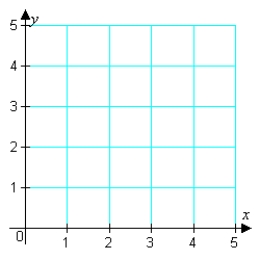
A)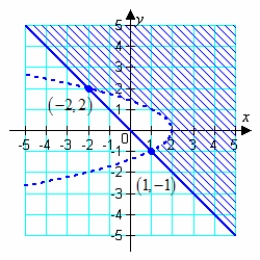
B)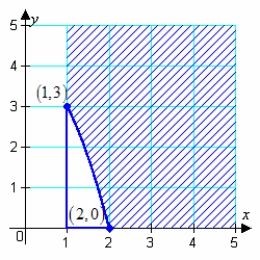
C)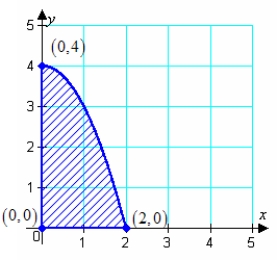
D)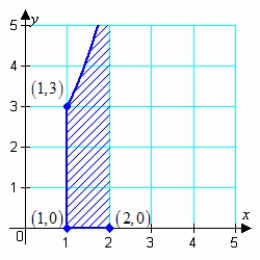
E)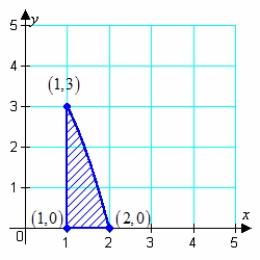


A)

B)

C)

D)

E)


Unlock Deck
Unlock for access to all 94 flashcards in this deck.
Unlock Deck
k this deck
64
A dietitian designs a special diet supplement using two different foods.Each ounce of food X contains 10 units of calcium, 15 units of iron, and 20 units of vitamin B.Each ounce of food Y contains 15 units of calcium, 10 units of iron, and 20 units of vitamin B.The minimum daily requirements for the diet are 380 units of calcium, 240 units of iron, and 390 units of vitamin B.Which combinations of foods X and Y below, if any, can be given to the patient to meet the minimum daily requirements? Combination I :
21 ounces of food X and 22 ounces of food Y
Combination II :
16 ounces of food X and 19 ounces of food Y
Combination III :
10 ounces of food X and 10 ounces of food Y
A) Only combinations II and III meet the minimum daily requirement.
B) Only combination II meets the minimum daily requirement.
C) None of the combinations meet the minimum daily requirement.
D) Only combinations I and II meet the minimum daily requirement.
E) Only combination III meets the minimum daily requirement.
21 ounces of food X and 22 ounces of food Y
Combination II :
16 ounces of food X and 19 ounces of food Y
Combination III :
10 ounces of food X and 10 ounces of food Y
A) Only combinations II and III meet the minimum daily requirement.
B) Only combination II meets the minimum daily requirement.
C) None of the combinations meet the minimum daily requirement.
D) Only combinations I and II meet the minimum daily requirement.
E) Only combination III meets the minimum daily requirement.

Unlock Deck
Unlock for access to all 94 flashcards in this deck.
Unlock Deck
k this deck
65
Find the minimum and maximum values of the objective function and where they occur, subject to the indicated constraints.(You should graph the feasible solutions on the grid below before you attempt to find the minimum and maximum values.) Objective function:  Constraints:
Constraints: 
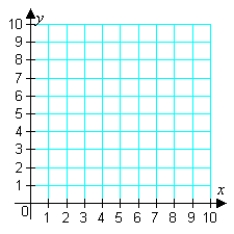
A)
B)
C)
D)
E)
 Constraints:
Constraints: 

A)

B)

C)

D)

E)


Unlock Deck
Unlock for access to all 94 flashcards in this deck.
Unlock Deck
k this deck
66
For the given supply and demand equations, find the consumer surplus. Round to the nearest dollar. Demand Supply
P = 170 - 0.00003x p = 140 + 0.00004x
A) $2,755,102
B) $3,030,612
C) $3,306,122
D) $4,132,653
E) $3,673,469
P = 170 - 0.00003x p = 140 + 0.00004x
A) $2,755,102
B) $3,030,612
C) $3,306,122
D) $4,132,653
E) $3,673,469

Unlock Deck
Unlock for access to all 94 flashcards in this deck.
Unlock Deck
k this deck
67
Derive a set of inequalities to describe the region. Triangle: vertices at (0, 0), (5, 0), (5, 4)
A)
B)
C)
D)
E)
A)

B)

C)

D)

E)


Unlock Deck
Unlock for access to all 94 flashcards in this deck.
Unlock Deck
k this deck
68
Graph the solution set of the system of inequalities below. 
A)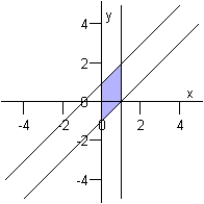
B)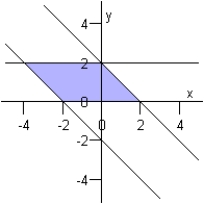
C)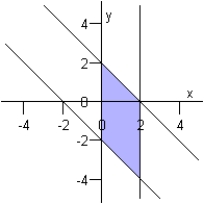
D)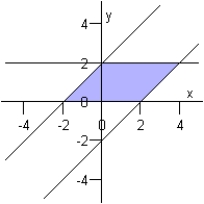
E)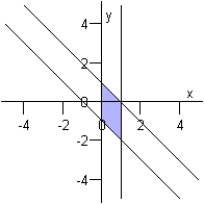

A)

B)

C)

D)

E)


Unlock Deck
Unlock for access to all 94 flashcards in this deck.
Unlock Deck
k this deck
69
Find which of the following system of inequalities has a right triangle as a graphed solution set. System I:  System II:
System II:  System III:
System III: 
A) No systems have a right triangle as a graphed solution set.
B) Only systems II and III have a right triangle as a graphed solution set.
C) Only systems I and III have a right triangle as a graphed solution set.
D) Only system I has a right triangle as a graphed solution set.
E) Only systems I and II have a right triangle as a graphed solution set.
 System II:
System II:  System III:
System III: 
A) No systems have a right triangle as a graphed solution set.
B) Only systems II and III have a right triangle as a graphed solution set.
C) Only systems I and III have a right triangle as a graphed solution set.
D) Only system I has a right triangle as a graphed solution set.
E) Only systems I and II have a right triangle as a graphed solution set.

Unlock Deck
Unlock for access to all 94 flashcards in this deck.
Unlock Deck
k this deck
70
Write a system of inequalities whose solution set is graphed below. 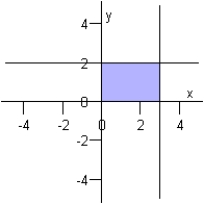
A)
B)
C)
D)
E)

A)

B)

C)

D)

E)


Unlock Deck
Unlock for access to all 94 flashcards in this deck.
Unlock Deck
k this deck
71
Sketch the graph of the solution set of each system of inequalities. 

A)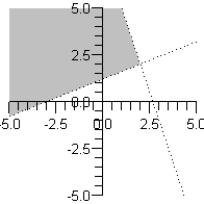
B)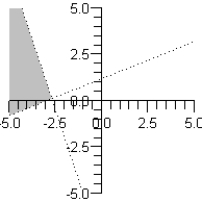
C)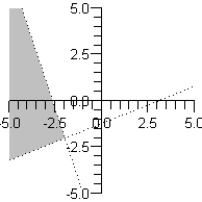
D)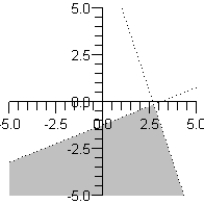
E)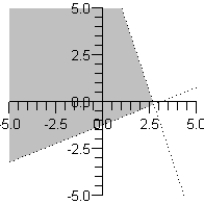


A)

B)

C)

D)

E)


Unlock Deck
Unlock for access to all 94 flashcards in this deck.
Unlock Deck
k this deck
72
A company makes two types of telephone answering machines: the standard model and the deluxe model.Each machine passes through three processes: 
 and
and  One standard answering machine requires 2 hours in
One standard answering machine requires 2 hours in  5 hours in
5 hours in  and 3 hours in
and 3 hours in  One deluxe answering machine requires 3 hours in
One deluxe answering machine requires 3 hours in  5 hours in
5 hours in  and 1 hour in
and 1 hour in  Because of employee work schedules,
Because of employee work schedules,  is available for 30 hours,
is available for 30 hours,  is available for 55 hours, and
is available for 55 hours, and  is available for 27 hours.If the profit is $47 for each standard model and $28 for each deluxe model, how many units of each type should the company produce to maximize profit?
is available for 27 hours.If the profit is $47 for each standard model and $28 for each deluxe model, how many units of each type should the company produce to maximize profit?
A) 8 standard models and 3 deluxe models
B) 9 standard models and 0 deluxe models
C) 10 standard models and 0 deluxe models
D) 0 standard models and 10 deluxe models
E) 3 standard models and 8 deluxe models

 and
and  One standard answering machine requires 2 hours in
One standard answering machine requires 2 hours in  5 hours in
5 hours in  and 3 hours in
and 3 hours in  One deluxe answering machine requires 3 hours in
One deluxe answering machine requires 3 hours in  5 hours in
5 hours in  and 1 hour in
and 1 hour in  Because of employee work schedules,
Because of employee work schedules,  is available for 30 hours,
is available for 30 hours,  is available for 55 hours, and
is available for 55 hours, and  is available for 27 hours.If the profit is $47 for each standard model and $28 for each deluxe model, how many units of each type should the company produce to maximize profit?
is available for 27 hours.If the profit is $47 for each standard model and $28 for each deluxe model, how many units of each type should the company produce to maximize profit?A) 8 standard models and 3 deluxe models
B) 9 standard models and 0 deluxe models
C) 10 standard models and 0 deluxe models
D) 0 standard models and 10 deluxe models
E) 3 standard models and 8 deluxe models

Unlock Deck
Unlock for access to all 94 flashcards in this deck.
Unlock Deck
k this deck
73
Sketch the graph of the solution set of each system of inequalities. 

A)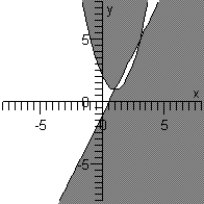
B)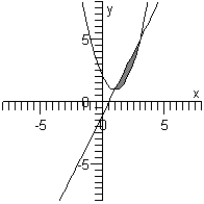
C)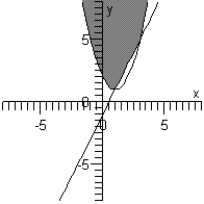
D)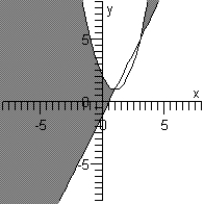
E)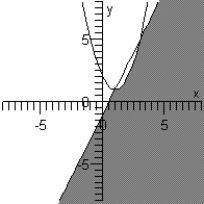


A)

B)

C)

D)

E)


Unlock Deck
Unlock for access to all 94 flashcards in this deck.
Unlock Deck
k this deck
74
You plan to invest up to $30,000 in two different interest-bearing accounts.Each account is to contain at least $9000.Moreover, one account should have at least three times the amount that is in the other account.Find a system of inequalities that describes the amount that you can invest in each account.
A)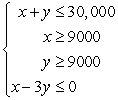
B)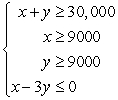
C)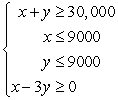
D)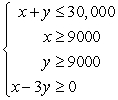
E)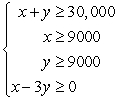
A)

B)

C)

D)

E)


Unlock Deck
Unlock for access to all 94 flashcards in this deck.
Unlock Deck
k this deck
75
A furniture company produces tables and chairs.Each table requires 1 hour in the assembly center and 2.25 hours in the finishing center.Each chair requires 0.75 hour in the assembly center and 0.5 hour in the finishing center.The company's assembly center is available 18 hours per day, and its finishing center is available 12 hours per day.Let  and
and  be the number of tables and chairs produced per day, respectively.Find a system of inequalities describing all possible production levels.
be the number of tables and chairs produced per day, respectively.Find a system of inequalities describing all possible production levels.
A)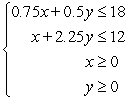
B)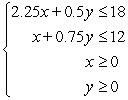
C)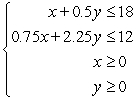
D)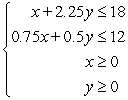
E)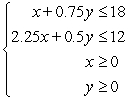
 and
and  be the number of tables and chairs produced per day, respectively.Find a system of inequalities describing all possible production levels.
be the number of tables and chairs produced per day, respectively.Find a system of inequalities describing all possible production levels.A)

B)

C)

D)

E)


Unlock Deck
Unlock for access to all 94 flashcards in this deck.
Unlock Deck
k this deck
76
Which of the following vertices of the constraint region shown is a maximum value of the objective function below. 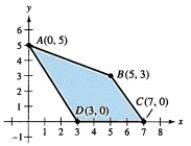

A) only vertex C
B) vertices A and D
C) vertices B and C
D) only vertex D
E) only vertex B


A) only vertex C
B) vertices A and D
C) vertices B and C
D) only vertex D
E) only vertex B

Unlock Deck
Unlock for access to all 94 flashcards in this deck.
Unlock Deck
k this deck
77
An ice cream supplier has two machines that produce vanilla and chocolate ice cream.To meet one of its contractual obligations, the company must produce at least 11 gallons of vanilla ice cream and 90 gallons of chocolate ice cream per day.One machine makes 5 gallons of vanilla and 6 gallons of chocolate ice cream per hour.The second machine makes 1 gallons of vanilla and 14 gallons of chocolate ice cream per hour.It costs $21 per hour to run machine 1 and $26 per hour to run machine 2.How many hours should each machine be operated to fulfill the contract at the least expense?
A) Machine 1 for 6 hours and machine 2 for 1 hour.
B) Machine 1 for 1 hour and machine 2 for no hours.
C) Machine 1 for 1 hour and machine 2 for 6 hours.
D) Machine 1 for 6 hours and machine 2 for no hours.
E) Machine 1 for no hours and machine 2 for 1 hour.
A) Machine 1 for 6 hours and machine 2 for 1 hour.
B) Machine 1 for 1 hour and machine 2 for no hours.
C) Machine 1 for 1 hour and machine 2 for 6 hours.
D) Machine 1 for 6 hours and machine 2 for no hours.
E) Machine 1 for no hours and machine 2 for 1 hour.

Unlock Deck
Unlock for access to all 94 flashcards in this deck.
Unlock Deck
k this deck
78
An investor has $300,000 to invest in two types of investments.Type A pays 5% annually and type B pays 7% annually.To have a well-balanced portfolio, the investor imposes the following conditions.At least one-third of the total portfolio is to be allocated to type A investments and at least one-third of the portfolio is to be allocated to type B investments.What is the optimal amount that should be invested in each investment? 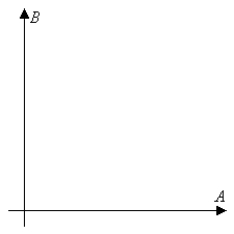
A) $100,000 in type A (5%), $200,000 in type B (7%)
B) $0 in type A (5%), $300,000 in type B (7%)
C) $200,000 in type A (5%), $100,000 in type B (7%)
D) $300,000 in type A (5%), $0 in type B (7%)
E) $110,000 in type A (5%), $190,000 in type B (7%)

A) $100,000 in type A (5%), $200,000 in type B (7%)
B) $0 in type A (5%), $300,000 in type B (7%)
C) $200,000 in type A (5%), $100,000 in type B (7%)
D) $300,000 in type A (5%), $0 in type B (7%)
E) $110,000 in type A (5%), $190,000 in type B (7%)

Unlock Deck
Unlock for access to all 94 flashcards in this deck.
Unlock Deck
k this deck
79
Which of the following vertices of the constraint region shown is a minimum value of the objective function below. 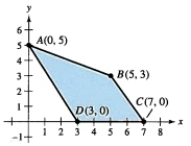

A) vertices C and D
B) only vertex C
C) only vertex A
D) vertices B and C
E) only vertex D


A) vertices C and D
B) only vertex C
C) only vertex A
D) vertices B and C
E) only vertex D

Unlock Deck
Unlock for access to all 94 flashcards in this deck.
Unlock Deck
k this deck
80
Find the minimum and maximum values of the objective function and where they occur, subject to the indicated constraints. Objective function:  Constraints:
Constraints: 
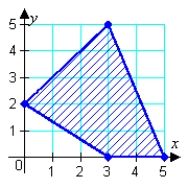
A)
B)
C)
D)
E)
 Constraints:
Constraints: 

A)

B)

C)

D)

E)


Unlock Deck
Unlock for access to all 94 flashcards in this deck.
Unlock Deck
k this deck


